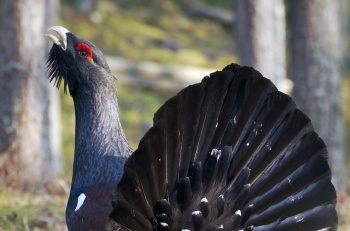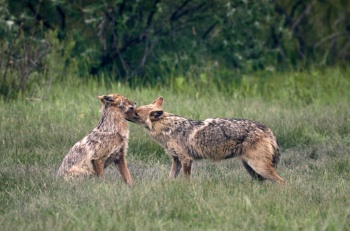WILDNIS EUROPA (Staffel 2)
- Genre
- Dokumentationsreihe
- Format
- 4 K
- Länge
- 4 x 52 min / 4 x 43 min
- Land/Jahr
- DE 2022
- Regie
- Marlene Wynants, Sebastian Lindemann, Carmen Butta
Die Wildnis Europas mit ihren Wäldern, Meeren und Nationalparks bietet einzigartige und überraschende Landschaften. Die zweite Staffel von WILDNIS EUROPA porträtiert vier ihrer seltensten tierischen Bewohner und führt uns dabei in faszinierende Lebensräume: vom skandinavischen Hochgebirge bis an die sonnige Mittelmeerküste. Die vier Folgen stellen jeweils ein Tier und seine Lebenswelt in den Mittelpunkt: den imposanten Moschusochsen, das scheue Auerhuhn, den anpassungsfähigen Goldschakal und den Mufflon, den wilden Ahnen des heutigen Hausschafs. Die Tiere führen uns auf eine Entdeckungsreise durch einzigartige Lebensräume und urzeitliche Landschaften, sie lassen uns politische Grenzen überqueren und zeigen uns Europa in seiner ganzen Vielfalt.
Was sind ihre Herausforderungen in einer sich verändernden Welt? Wie wirkt sich der Klimawandel auf sie aus, und wie verteidigen sie ihr Territorium gegen menschliche Einflüsse? Mensch und Klimawandel sind die Bedrohung, gegen die sie sich wappnen müssen. Der Appell: Wir müssen die Natur schützen, solange es noch nicht zu spät ist.
Wilderness Europe (Series 2)
The wilderness of Europe, with its forests, seas and national parks, offers unique and surprising landscapes. The second series of “WILDNIS EUROPA” portrays four of its rarest animal inhabitants and takes us to fascinating habitats: from the high mountains of Scandinavia to the sunny Mediterranean coast.
The four episodes each focus on one animal and its habitat: the imposing musk ox, the shy wood grouse, the adaptable golden jackal and the mouflon, the wild ancestor of today's domestic sheep. The animals lead us on a voyage of discovery through unique habitats and primeval landscapes, allowing us to cross political borders and show us Europe in all its diversity.
What are their challenges in a changing world? How does climate change affect them and how do they defend their territory against human influences? Humans and climate change are the threats they now have to arm themselves against. Our appeal: we must protect nature before it’s too late.
Buch, Regie/script, directors: Marlene Wynants, Sebastian Lindemann, Carmen Butta
Produktion/production: Gebrüder Beetz Filmproduktion Lüneburg GmbH in Koproduktion mit/in co-production with: ZDF
Produzent/producer: Reinhardt Beetz
Producerinnen/creative producers: Nadine Neumann, Marlene Wynants
Produktionsleitung/production managers: Juliane Hribar, Gebrüder Beetz; Katharina Krohmann, ZDF
Kamera/camera: Jan Zabeil, Eddy Zimmermann, Jens Saathoff, Dino von Wintersdorff, Gary Krosnoff
Ton/sound: Lukas Seiler, Andreas Nordmeyer, Nicolas Winkelhahn, Lukas Röhrdanz
Schnitt/editing: Jens Greuner, Marion Pohlschmidt, Maren Grossmann
Postproduktion/post-production: Malte Hadeler
Colour Grading: Bernie Greiner
Mischung/sound mix: Pierre Brandt, Sascha Prangen
Grafik/graphics: Stefan Matlik
Musik/music: Paul Timmich, Nils Kacirek
Sprecherin/speaker: Nina Petri
Redaktion/commissioning editor: Marita Hübinger, ZDF/ARTE
Fotos/photos: © Gebrüder Beetz Filmproduktion, Pond5, Fabian Mühlberger Photography, Film Studio Aves, Kari Kemppainen, Carmen Butta, Georgios Papapetrou
Drehorte/locations: Deutschland (Schwarzwald, Niederlausitz, Lüneburg), Italien (Sardinien, Fogliano Redipúglia), Zypern, Österreich (Tirol, Burgenland), Norwegen (Oppdal), Schweden (Jädraas, Funäsdalen), Polen (Mauren, Kadzidlowo)
Drehzeit/shooting time: 09/2021-01/2022
Erstausstrahlungen/TV premieres: 13.06.2022 (DER MOSCHUSOCHSE + DAS AUERHUHN), 14.06.2022 (DER GOLDSCHAKAL+ DER MUFFLON), ARTE
Förderung/financial support: nordmedia - Film- und Mediengesellschaft Niedersachsen/Bremen mbH (Produktion/production)
Information:
Gebrüder Beetz Filmproduktion Lüneburg GmbH
Auf der Hude 88
21339 Lüneburg
E-Mail: lueneburg@gebrueder-beetz.de
Weltvertrieb/world distribution:
Off the Fence









